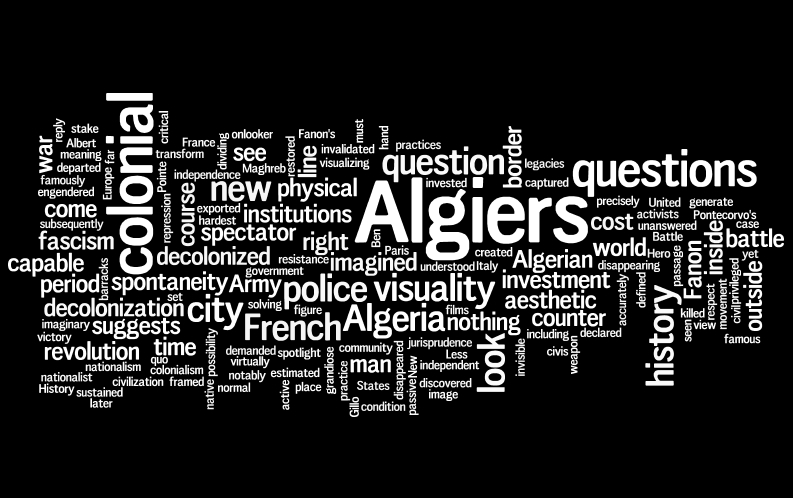Caché
Caché
Hidden
"ch'uis pas responsable"
"'M no' responsible""C'est normale, non?"
"It is what it is"
 That which is "hidden" in the title of Michael Haneke's taut 2005 film of that title is the complex legacy of "Algeria" in Europe.
That which is "hidden" in the title of Michael Haneke's taut 2005 film of that title is the complex legacy of "Algeria" in Europe.The phrases above are transcribed and translated from the lead character Georges's self-defense within the film.
Plot summary
Georges Laurent (Daniel Auteuil), a talking head presenter on TV, is a symbol of the BoBo (Bourgeois/Bohemian) colonization of the Paris suburbs. Traditional intello (intellectual) Paris was in the 5th and 6th arrondissements. As we are often shown, the Laurent household is in the 13th, a former leftist and immigrant neighborhood. That is just one of the pasts being forgotten here.He lives with his wife, Anne (Juliette Binoche), and their son, Pierrot (Lester Makedonsky.) This enviable life is interrupted by the arrival of a series of anonymous videotapes, showing their apartment under surveillance, accompanied by violent drawings of a child vomiting blood or a chicken being slaughtered. As the mysterious tapes continue, it gradually emerges that the drawings represent scenes from Georges' rural childhood, when his parents employed two Algerians as workers, who lived at the farm along with their son, Majid. The parents disappeared after attending the now infamous demonstrations in Paris on October 17, 1961. Called by the FLN to demonstrate support of Algerians in France for independence, the demonstration was met with the most extreme police repression led by former Vichy police chief, Maurice Papon. Hundreds were killed and deposited in the river Seine, a moment that seems to be recurringly forgotten and remembered in France.
Majid comes to live with Georges' family, causing the six-year-old Georges to stage some clumsy attempts to have Majid sent away that culminate in success after he tricks Majid into slaughtering a rooster. These scenes are depicted in the drawings accompanying the videos that have now moved on to show Georges' family home. Enraged, Georges tracks down Majid (Maurice Bénichou), who denies all involvement with the tapes as does his son Hashem (Walid Afkir). Nonetheless, the tapes continue but Majid continues to deny being their author and then commits suicide in Georges' presence by cutting his throat, an incident again videotaped and distributed. The film concludes with a long shot of Pierrot's school that shows him meeting up with Hashem.
Visual analysis
For all its excellent intentions, Caché exemplifies what Walter Mignolo has called the "Eurocentric critique of Eurocentrism."Indeed, much of the discussion of the film has centered on the ever-elusive "universal" values it supposedly embodies. What matters for Caché is the impact of Algeria on French lives and minds, metonymic here of European bad faith but with limitations of place, ethnicity and gender. These constraints are epitomized in the central figure for the film of the viewpoint: who is looking? From where? At what?
And for what purpose?
The pictures that arrive with the tapes recall the drawings in J'ai huit ans. These drawings are not therapeutic visualizations but a means of accusation, gradually advancing the narrative of the childhood trauma. But they were not drawn by a child but by an adult remembering disavowed traumatic experience in childhood. Or is "trauma" really the right word? Georges once refers to it as a "tragedy" but immediately disavows that concept by saying "c'est normale/it is what it is."
As the tapes arrive, Georges has a sequence of flashbacks that pass very quickly across the screen, interrupting the narrative without visual or textual explanation. That is, at first, there is no context in which what we see makes sense, and the remembered episodes are represented in the same high-fidelity "realist" style as the rest of the film, rather than a staged "memory" or "dream" sequence.
All the videos in the film, from the opening shot of Georges' and Anne's apartment to the closing sequence of Pierrot's school, use the same angle of vision. The camera is placed at a medium distance from the events being watched, slightly to the right of center. Towards the end of the film, it becomes clear that the viewpoint from which the video surveillance tapes have been made replicates the place from which the six-year-old Georges watched Majid being taken to a state institution.
Much of the commentary on the film stresses the question: who made the tapes? The only person that knew the viewpoint was Georges. The only person that knows what Georges thinks is "Michael Haneke." In other words, the film knows its own secret and wants to reveal it, while playing with the "hidden." Like Georges, the film wants to be found out. His parents felt "responsible" for the death of Majid's parents and adopted him. Georges was six: if his birthday was later in the year than October 17, then he was the same age as the Algerian War. France, metonymically represented as Georges, insists "ch'uis pas responsable/I'm not responsible."
Kant claimed that Europe was Enlightened because it had achieved the age of emancipation. Postcolonial Europe has reverted to the language of (spoiled) children:
- I don't want to share
- I don't care what you think
- It's not my fault
- He did it
This page is a tag of:
| Previous page on path | Main Route, page 8 of 13 | Next page on path |
Discussion of "Caché"
Add your voice to this discussion.
Checking your signed in status ...